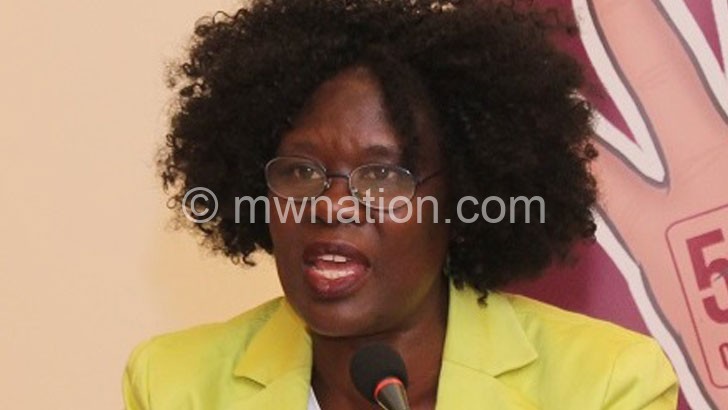Govt faulted on gender in boards
President Lazarus Chakwera’s administration has come under fire from gender advocates and Malawi Law Society (MLS) for failing to fulfil the Gender Equality Act (GEA) of 2013 in the appointment of people into various parastatal boards.
While the GEA stipulates appointment of not less than 40 percent and not more than 60 percent of either sex in public service, out of the 54 completely filled boards, 11 representing 20.37 percent comply with the law. This means that the remaining 79.63 percent fall short of this law.
In Section 11 (1), the GEA stresses the need for 60:40 representation in line with the Southern Africa Development Community (Sadc) Gender Protocol and African Union (AU) Women Protocol.

Reads the law: “Notwithstanding anything contained in the Public Service Act and subject to subsection (2), an appointing or recruiting authority in the public service shall appoint no less than 40 percent and no more than sixty per cent of either sex in any department in the public service.”
In her reaction, NGO-Gender Coordination Network (NGO-GCN) chairperson Barbara Banda, who has declined her appointment to the board of Technical, Entrepreneurial and Vocational Education Authority (Teveta), said what government has done is illegal and sends bad signals.
She said: “It’s not right! This is breaking the law. In fact, the 40 percent is not for women, it can be 60 percent women and 40 percent for men. We also see that there are boards where there are absolutely no women. This is showing that women’s issues in those boards do not have any precedence.
“Only 10 women are board chairs. This in conclusion shows that women are not taking decision-making positions at the highest level. The appointing authorities are in the forefront breaking the law. How do they go to the private sector to ask them to follow the law?”
An analysis by NGO-GCN shows growing disparities that the country continues to face, especially on marginalisation of women in appointed positions.
The analysis reads in part: “Of particular worry is zero representation of women in a good 11 parastatal boards. Of peculiar note are hirings into Nurses and Midwives Council of Malawi [NMCM] and Malawi Institute of Education [MIE] where female members’ representation constitutes over 60 percent.”
Danwood Chirwa, a professor of law at the University of Cape Town in South Africa, said based on the GEA, no sex or gender can be less than 40 percent in any appointment. He said while this was a minimum requirement, government has a duty to do more.
He warned that a society that excludes some of its population from opportunities or public decision-making cannot be deemed to be acting for the common good as discrimination has now gained universal disapproval.
Said Chirwa: “Note how packed the Nursing Council is with women, and to some extent the Medical Council. The sexism in this lies in the portrayal of women as care takers. In some of the most critical parastatals they have been entirely excluded. That’s where men hold economic and political power.”
On its part, the Malawi Law Society (MLS) agreed with NGO-GCN calculations, observing that of the 54 completely filled boards, only 11 (20.37 percent) comply with Section 11 of the GEA.
In a letter congratulating its members appointed into various boards, MLS honorary secretary Martha Kaukonde asked the Attorney General (AG) to advise the appointing authority to make the necessary changes.
Secretary to the President and Cabinet Zanga Zanga Chikhosi, who signed the press statement announcing the boards, said Minister of Information Gospel Kazako—as the official government spokesperson—was better-placed to speak on the matter.
When contacted, Kazako asked for more time before commenting on the matter.
On the other hand, Attorney General Chikosa Silungwe said he was yet to see the communication from MLS and would only respond on Monday upon seeing it.
Meanwhile, NGO-GCN, Human Rights Defenders Coalition, Youth and Society and Women Lawyers Association have given government seven days to reconstitute the non-compliant boards or face court action.
In a letter dated September 27 2020 to the SPC, the civil society organisations argue that the appointments violate both local and international legal instruments.
“All the non-complying boards be reconsttituted within seven days from the date herein. Most importantly, the next appointments of the non-complying bboards should comply with their specific enabling laws as well as the Constitution as read with the Gender Equality Act.”
Parastatals that do not have female representation include Malawi Accountants Board, Roads Fund Administration, Electricity Supply Corporation of Malawi, Malawi Energy Regulatory Authority, Roads Authority, Malawi Communications Regulatory Authority and Agricultural Development and Marketing Corporation.
During campaign for the court-ordered June 23 Fresh Presidential Election, Chakwera pledged that the Tonse Alliance administration will ensure at least 40 percent women representation in appointments to public institutions. However, the President shot himself in the foot when he appointed a 31-member Cabinet with 12 women, representing 38 percent.
Malawi signed progressive human rights instruments on women’s rights and gender equality, but there is little progress. These include the Convention on Elimination of All Forms of DiscriminationAgainst Women (Cedaw), African Protocol on Women’s Rights and Sadc Protocol on Gender and Development.





